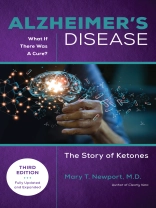Third Edition, Fully Updated and Expanded
There is hope, there is relief, there is another way to treat Alzheimer’s disease!
More than 6.5 million people in the United States suffer from Alzheimer’s and other neurodegenerative diseases. Dr. Mary T. Newport’s husband, Steve, was one of them. In Alzheimer’s Disease: What If There Was a Cure?, Dr. Newport shares Steve’s story—how he fell into the abyss that is Alzheimer’s disease and was able to climb back out to enjoy a nearly four-year reprieve from the disease, thanks to a dietary intervention with coconut oil and MCT (medium-chain triglyceride) oil.
Since Steve’s remarkable turnaround from early-onset Alzheimer’s in 2008, Dr. Newport has communicated with hundreds of people and their caregivers dealing with neurodegenerative diseases. In addition to detailing the most recent research on the links between Alzheimer’s and many common medications, Dr. Newport illustrates how infection, inflammation, and genetic makeup may affect an individual’s response to fatty-acid therapy. She also covers the recent advances in imaging technologies, which have made it possible to detect subtle changes in the brain a decade or more before a person develops obvious symptoms, giving at-risk individuals the opportunity to take preventive measures. While the cause of Alzheimer’s disease is not known, Dr. Newport’s research offers a message of hope and shows how adopting certain lifestyle changes could prevent, delay, or otherwise alter the course of the disease.
Over de auteur
MARY T. NEWPORT, M.D., grew up in Cincinnati, Ohio, and was educated at Xavier University and University of Cincinnati College of Medicine. She is board certified in pediatrics and neonatology, and she completed her training at Children’s Hospital Medical Center in Cincinnati and Medical University Hospital in Charleston, South Carolina. She practiced neonatology in Florida for thirty years and was the founding medical director of two newborn intensive care units in the Tampa Bay area. More recently, Dr. Newport has practiced at the opposite end of the spectrum, providing care for hospice patients in the Tampa Bay area for nearly three years and in-home health risk assessments thereafter. She writes and speaks in the United States and around the world on ketones as an alternative fuel for the brain for Alzheimer’s and other disorders.












